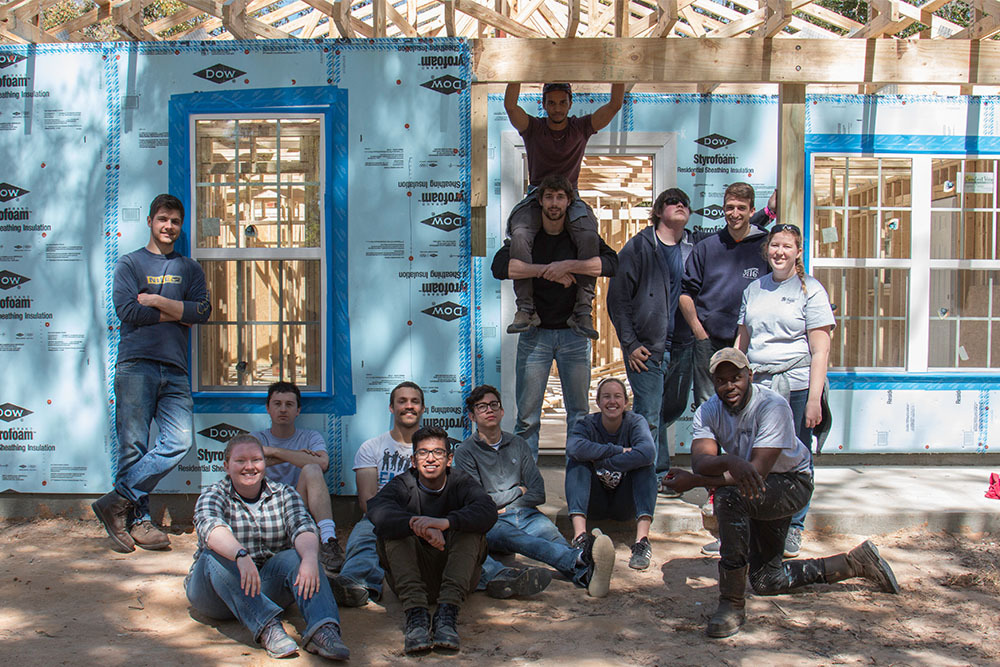They headed south, but not for a warm spring break beach. Instead, they chose what would at times be grueling work, and to learn from the people and places they would meet and visit.

And they were well received.
The Eastern Mennonite University students on four Y-trips this spring all found their way to Georgia, but each had a unique destination: Jubilee Partners, Casa Alterna and Habitat for Humanity, and various historic sites of the Civil Rights Movement.
Y-trips are coordinated by the Young People’s Christian Association, or Y-Serve, the longest-running student organization at EMU. It aims to “serve others as the hands and feet of Jesus.”
Read about Y-Serve, EMU’s oldest and most influential student organization, and see a timeline of its history.
Jubilee: real work, real people
At Jubilee Partners, an intentional Christian community in Comer, Georgia, that offers hospitality to refugees, Emma Stutzman spent hours digging swales to capture and store rainwater. The taxing work took her out of her comfort zone and led to “sore arms, sweaty bodies and blisters.” She knew, though, that the work “would lead to better irrigation for the garden, which would in turn lead to better crops, and that this would mean Jubilee would be better able to provide for the refugees that it hosts,” she said.
In sessions that Stutzman said were “extremely meaningful,” the group also learned about refugees, the Karen from Myanmar/Burma, and individuals on death row.

“In addition to learning factual information,” she said, “we got a glimpse into the ways they impacted real people who we were getting to know.”
But what most struck Stutzman was the hospitality shown the group by their hosts, including by two refugee families who had recently moved from Jubilee into their own homes nearby.
“As impactful as our days spent on Jubilee grounds were,” she said, “it was this night spent in the home of a refugee family who had so little, observing their generosity and hospitality towards people they had only just met, that sticks out as one of the most memorable parts of the trip.”

Casa Alterna: ‘selfless hospitality’ and thirsting for justice
Perry Blosser’s group visited Casa Alterna, a Christian outreach to immigrant families from Latin America located in LaGrange, Georgia, where they stayed with primarily first-wave immigrants from Guatemala.
“We all felt overwhelmingly blessed by the selfless hospitality shown to us,” Blosser said. “We were, in this case, the strangers being welcomed” – including to birthday parties and even to visit a newborn in the hospital.
In addition to glazing windows, painting and power-washing houses, helping with after-school tutoring and recreation and learning how to make tamales, the group visited detained immigrants in a medium security detention center. There, Blosser said, “we learned to ‘thirst’ for justice for the marginalized, to rehumanize our detained friends and to see them as Jesus would.”
Habitat for Humanity: ‘an incredible display of teamwork’
A third group traveled to Valdosta for Habitat for Humanity’s Collegiate Challenge. They partnered with a group from De Sales University to construct a house, from building walls to placing bathtubs and roofing.
“It was really awesome to watch how quickly everything moved when we worked together,” Bekah Mongold said. At the end of one day, the group realized they had overlooked a wall that needed to be built. It was almost time to leave, but a team of a dozen or so “descended on the wall and we got it completely done in less than 10 minutes,” she said. “It was an incredible display of teamwork.”

The work was not glamorous, Mongold said, “but all of it was necessary. I found myself a little discouraged at times when I wasn’t working on the actual house. I was gently reminded however, that the pile of dirt we were taking down needed to be done. It was, in fact, part of turning those raw materials and a sandy lot into a place somebody is going to call home. I am both thankful and humbled to be a part of that.”
The hospitality shown this group, too, by hosting church groups meant that they met many “wonderful people” who received them warmly – with open arms, Mongold said.
“Oh, ya’ll are the Habitat group! We’re so glad you’re here,” they heard time and again. “We look forward to this week every year!”
Now back on campus, Blosser misses his supportive Y-trip community. “We were forced to be adaptive,” he said. “We were all experiencing new things and being stretched in different ways, and we learned to care for each other as we each needed it.”
